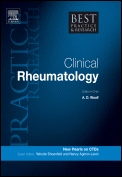
Rheumatology & Autoimmunity
Scope & Guideline
Empowering professionals through open access to vital research.
Introduction
Aims and Scopes
- Autoimmunity Mechanisms:
The journal emphasizes research on the underlying mechanisms of autoimmunity, exploring genetic, molecular, and immunological factors that contribute to autoimmune diseases. - Clinical Insights and Management Strategies:
A significant focus is placed on clinical studies that provide insights into the management of rheumatic diseases, including novel therapeutic approaches and treatment outcomes. - Biomarkers and Disease Prediction:
The identification and validation of biomarkers for diagnosis and prognosis in autoimmune diseases is a key area, helping to tailor individualized treatment plans. - Impact of Environmental and Lifestyle Factors:
Research exploring the influence of environmental factors, lifestyle, and comorbid conditions on the onset and progression of autoimmune diseases is actively covered. - Innovations in Treatment Approaches:
The journal publishes studies on innovative treatments, including biologics, immunotherapies, and the use of artificial intelligence in treatment protocols. - Epidemiological Studies:
Epidemiological research that sheds light on the prevalence, incidence, and burden of autoimmune diseases globally is a critical component of the journal's scope.
Trending and Emerging
- Artificial Intelligence in Rheumatology:
The application of artificial intelligence and big data analytics in understanding and managing autoimmune diseases is gaining traction, indicating a technological shift in research methodologies. - COVID-19 and Autoimmunity:
The intersection of COVID-19 with autoimmune diseases has become a prominent theme, with research exploring the impact of the pandemic on patients and the implications for treatment. - Personalized Medicine and Targeted Therapies:
There is a growing emphasis on personalized medicine approaches, including the use of targeted therapies and biomarker-driven treatment strategies, reflecting advancements in precision medicine. - Role of Microbiome and Environmental Factors:
Emerging research is increasingly focusing on the role of the microbiome and environmental triggers in the pathogenesis of autoimmune diseases, highlighting a holistic view of patient health. - Sex Differences in Autoimmunity:
The exploration of sex differences in autoimmune disease presentation and treatment responses is a burgeoning area of interest, recognizing the importance of gender in disease dynamics.
Declining or Waning
- Traditional Pharmacological Treatments:
There appears to be a decreasing focus on conventional pharmacological treatments for autoimmune diseases, as newer, more targeted therapies gain prominence in research. - Historical Perspectives on Autoimmunity:
Research centered around historical or retrospective analyses of autoimmune diseases has diminished, possibly due to a shift towards more innovative and forward-looking studies. - Basic Science Studies without Clinical Relevance:
Basic science research that lacks direct clinical applicability is being published less frequently, as there is a growing emphasis on studies that demonstrate clear translational potential. - Single Disease Focus Studies:
There is a noticeable decline in studies focusing solely on individual autoimmune diseases, with a trend towards more integrated approaches that consider multiple conditions and comorbidities.
Similar Journals

Journal of Rheumatic Diseases
Empowering discovery through open-access rheumatology research.Journal of Rheumatic Diseases, published by the Korean College of Rheumatology, stands as a pivotal platform in the field of rheumatology, contributing significantly to the advancement of knowledge and clinical practice since its inception. With an impact factor reflecting its esteemed position in the academic community, this open-access journal promotes accessibility to high-quality research, ensuring that groundbreaking discoveries are reachable to all stakeholders in the realm of rheumatic diseases. The journal has maintained its commitment to quality, evidenced by its ranking in the Q3 category for Rheumatology in 2023, and its presence among the top quartiles of medical research. Focusing on innovative therapeutic approaches, emerging diagnostic techniques, and comprehensive reviews, the Journal of Rheumatic Diseases seeks to foster collaboration and dialogue among researchers, clinicians, and students alike. For accessibility, the journal offers numerous articles since its transition to open access in 2017, thereby facilitating research dissemination across the globe. As it converges over the years from 2019 to 2024, the journal promises to be instrumental in shaping the future of rheumatic disease research, inviting contributions that inspire new frontiers in this essential field.

AUTOIMMUNITY
Pioneering insights into autoimmune diseases.AUTOIMMUNITY, published by Taylor & Francis Ltd, is an influential journal dedicated to advancing the understanding of autoimmune diseases through rigorous research and scholarly discourse. With an ISSN of 0891-6934 and an E-ISSN of 1607-842X, this journal serves as a key resource for immunologists, medical professionals, and students engaged in investigating the complex mechanisms underpinning autoimmunity. Operating from the United Kingdom, it offers valuable insights into immunological and allergic phenomena, achieving respectable Scopus rankings in both Immunology and Allergy (106/233, Q3) and Immunology and Microbiology (125/236, Q2). Covering a broad spectrum of topics since its inception in 1988, AUTOIMMUNITY encourages the dissemination of innovative research findings and aims to enhance collaborative efforts within the field. While it currently adopts a conventional access model, the journal's commitment to quality and excellence positions it as a vital platform for those looking to engage with cutting-edge research in immunology.

International Journal of Rheumatic Diseases
Illuminating the complexities of rheumatic diseases.The International Journal of Rheumatic Diseases, published by WILEY, serves as a crucial platform for disseminating high-quality research and advancements in the field of rheumatology. With an ISSN of 1756-1841 and an E-ISSN of 1756-185X, this journal has established itself within the academic community since its inception in 2008, and it is set to continue until at least 2024. Positioned in the Q3 category of rheumatology, the journal holds a significant rank of #38 out of 73 in its field according to Scopus, showcasing its growing influence despite the competitive environment. The absence of Open Access reflects a traditional scholarly publishing model, allowing for meticulous peer-review processes to ensure the rigor and reliability of published studies. This journal aims to foster innovative research, critical reviews, and clinical studies, thereby contributing to a deeper understanding of rheumatic diseases and enhancing patient care. The dedicated readership, including researchers, healthcare professionals, and students, will find valuable insights into the latest findings and methodologies relevant to rheumatology in the journal's comprehensive articles.

Open Access Rheumatology-Research and Reviews
Transforming Rheumatology Research through Accessibility.Open Access Rheumatology-Research and Reviews, published by DOVE MEDICAL PRESS LTD, is a distinguished journal that has been a vital part of the rheumatology field since its inception in 2009. With an ISSN of 1179-156X, this journal is dedicated to disseminating groundbreaking research and comprehensive reviews in the discipline of rheumatology, making it an essential resource for researchers, clinicians, and students alike. It boasts an impressive Q3 ranking in the Rheumatology category for 2023, reflecting its relevance and quality within a highly competitive landscape, where it ranks in the 51st percentile among its peers as indicated by the Scopus Ranks. As an open-access platform, it ensures that critical findings and insights are easily accessible to a global audience, promoting collaboration and knowledge sharing. The journal's scope includes a wide range of topics within rheumatology, aimed at advancing understanding and treatment of musculoskeletal disorders and autoimmune diseases. Its headquarters is located in New Zealand, positioning it as a key player in the international research community.

SCANDINAVIAN JOURNAL OF RHEUMATOLOGY
Championing Research for a Healthier TomorrowThe Scandinavian Journal of Rheumatology, published by Taylor & Francis Ltd, is a prestigious peer-reviewed journal dedicated to advancing research in the fields of rheumatology, immunology, and related disciplines. With an ISSN of 0300-9742 and an E-ISSN of 1502-7732, this journal has established itself as a vital platform for disseminating significant findings and innovative approaches in the management of rheumatic diseases since its inception in 1959. As a recognized scholarly outlet, it currently resides within the Q2 category for Medicine (miscellaneous) and ranks #39 out of 73 in Rheumatology according to the 2023 Scopus assessments. This reflects the journal's commitment to high-quality research and its relevance in the scientific community. Although it does not provide Open Access options, the journal's rigorous selection process ensures that only the most impactful research reaches its audience, making it a crucial resource for researchers, clinicians, and students engaged in the exploration of rheumatological and immunological challenges. The journal's broad scope encompasses ongoing studies, clinical trials, and reviews that aim to enhance understanding and treatment of rheumatic conditions, promoting collaboration and knowledge-sharing among professionals in the field.

JOURNAL OF RHEUMATOLOGY
Empowering Research, Transforming Patient CareJOURNAL OF RHEUMATOLOGY, published by the J Rheumatol Publ Co, stands as a distinguished platform within the fields of rheumatology and immunology since its inception in 1974. With an impressive impact evidenced by its 2023 rankings—Q1 in Rheumatology and Q2 in both Immunology and Allergy—the journal has secured its position as a vital resource for researchers and practitioners alike. The journal is dedicated to advancing clinical and experimental knowledge in the pathogenesis, diagnosis, and management of rheumatic diseases, providing a rich repository of peer-reviewed articles that drive innovation in treatment protocols and patient care. Although it operates under a subscription model, the journal remains accessible to a broad audience committed to advancing their understanding of these critical areas. Located in Toronto, Canada, it continues to attract contributions from leading experts globally, making it an essential read for anyone keen on staying at the forefront of rheumatological research and practice.

JOURNAL OF INVESTIGATIVE DERMATOLOGY
Unveiling the Mysteries of DermatologyJOURNAL OF INVESTIGATIVE DERMATOLOGY, published by Elsevier Science Inc, stands at the forefront of research in the fields of dermatology, biochemistry, cell biology, and molecular biology. With an impressive impact factor reflecting its Q1 ranking in Dermatology and Biochemistry, this journal provides a vital platform for disseminating groundbreaking research and innovative studies that drive forward our understanding of skin biology and disease. The journal has maintained a distinguished presence since its inception in 1945, successfully converging decades of scientific inquiry and expertise. It ranks among the top journals in medicine and dermatology, holding a remarkable 7th place out of 142 in the Scopus Medicine Dermatology category, signaling its influence and relevance in the academic community. Researchers, professionals, and students alike will find valuable insights into cutting-edge investigations and methodologies to advance their own studies in skin health and pathology. While the journal is not an open access publication, access options remain robust for institutions and individuals committed to the advancement of dermatological science.

Rheumatology Advances in Practice
Unlocking the future of rheumatology, one article at a time.Rheumatology Advances in Practice, published by Oxford University Press, is a vital open-access journal dedicated to advancing research and education in the field of rheumatology. With an E-ISSN of 2514-1775 and an impressive open access model established since 2017, this journal facilitates the dissemination of cutting-edge knowledge and innovative practices to a global audience. It has garnered recognition within the academic community, holding a Q3 classification in Rheumatology for 2023, which reflects its contribution to the evolving landscape of rheumatological research. The journal aims to present high-quality, peer-reviewed articles that explore the latest findings, advancements, and clinical applications in rheumatology, making it an essential resource for researchers, healthcare professionals, and students alike. By bridging the gap between research and practice, Rheumatology Advances in Practice plays a significant role in improving the care of patients with rheumatological conditions, promoting evidence-based approaches to clinical challenges.

LUPUS
Elevating knowledge in lupus through impactful research.LUPUS is a premier peer-reviewed journal published by SAGE Publications Ltd, focusing on the field of rheumatology, with a specific emphasis on the complexities of lupus and related autoimmune disorders. Since its inception in 1991, the journal has consistently ranked in the Q2 category within the rheumatology field, currently positioned as #29 out of 73 in Scopus, reflecting its significant contributions to research and clinical practice. The journal aims to foster a deeper understanding of lupus through the publication of original research articles, reviews, and clinical studies, making it an essential resource for researchers, clinicians, and students dedicated to advancing knowledge in this vital area of medicine. With an impact factor that underscores its influence, LUPUS serves as a critical platform for sharing innovative findings and engaging discussions within the global scientific community. Although the journal follows a traditional access model, it is situated in the United Kingdom, at 1 Olivers Yard, 55 City Road, London EC1Y 1SP, England, and remains dedicated to supporting the continuous advancement of research in autoimmune diseases.

BEST PRACTICE & RESEARCH IN CLINICAL RHEUMATOLOGY
Transforming Insights into Best PracticesBEST PRACTICE & RESEARCH IN CLINICAL RHEUMATOLOGY, published by Elsevier, stands as a premier journal in the field of rheumatology, holding a prestigious Q1 ranking in both Medicine (miscellaneous) and Rheumatology categories as of 2023. With an ISSN of 1521-6942 and an E-ISSN of 1521-1770, the journal is dedicated to advancing clinical knowledge and practice through the dissemination of high-quality, peer-reviewed research. Since its inception in 1995, this journal has provided a platform for researchers, clinicians, and healthcare providers to share significant advancements, best practices, and innovative insights that shape the standards of care in rheumatology. The commitment to open access publishing reflects its mission to broaden the reach of critical research findings, ensuring that professionals across the globe can access valuable information in this vital field. The journal's impressive Scopus ranking, positioned at #10 out of 73 in Medicine-Rheumatology, alongside its notable impact factor, underscores its importance and influence in guiding clinical practice and policy in rheumatologic conditions. By engaging with this journal, readers can stay informed about emerging trends and evidence-based strategies that are crucial for improving patient outcomes.